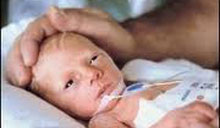 An article in yesterday’s Daily Telegraph, ‘Premature baby survives after doctors advised abortion’, tells the story of Jacob McMahon, who became Britain’s most premature surviving twin after he was born on February 22, just 23 weeks into pregnancy, at a weight of 1lb 4oz.
An article in yesterday’s Daily Telegraph, ‘Premature baby survives after doctors advised abortion’, tells the story of Jacob McMahon, who became Britain’s most premature surviving twin after he was born on February 22, just 23 weeks into pregnancy, at a weight of 1lb 4oz.
Doctors had advised Miss Fisher to abort Jacob after his twin sister, Emie, died when she was born at 21 weeks and six days due to an infection.
But Jacob followed eight days later, twelve hours before doctors would have demanded a final decision from the family on whether to terminate the pregnancy.
The legal upper limit for abortion is 24 weeks, but Jacob is one of a growing list of babies who survived despite being born before the threshold.
Five months later he has now been deemed healthy enough to leave hospital with his parents.
The story once again raises questions about resuscitation policies for premature babies.
The cover story in the summer edition of the CMF journal Triple Helix, written by Professor John Wyatt, reviews the recent BBC documentary ‘23 week babies – the price of life’, which represented six months of filming on the neonatal intensive care unit at Birmingham Women’s Hospital. The underlying theme was expressed in stark form by Adam Wishart, the presenter, ‘Is it worth trying to keep these babies alive?’ The opinion of many of the professionals interviewed was clearly ‘No’.
However, Wyatt raises a number of technical and clinical issues, which were not raised in the programme, in arguing that every extremely pre-term baby deserves the chance to be considered for treatment.
First he argues that gestational age cannot be measured with accuracy other than in IVF pregnancies when fertilisation occurs in the laboratory. In addition other clinical variables besides gestational age are crucially important in determining the likelihood of survival and the risks of disability. These include birth weight (the higher the better), gender (girls do better than boys), multiple pregnancies (singletons do better than twins and triplets), and whether antenatal steroids were given prior to delivery (antenatal steroids improve survival and reduce brain injury). It is a basic principle of medicine that we should individualise treatment to the specific patient we are caring for; so making blanket resuscitation rules based on gestational age alone is scientifically and medically indefensible.
Second, Outcome figures vary between different neonatal units. A statistic repeated in the programme was that nine out of 100 babies born at 23 weeks will survive and only one will reach adulthood without disability. It is not at all clear where this figure came from but it is highly contestable. A study based at University College London Hospitals, found an overall survival rate of 46% as a proportion of all live births at 23 weeks for the period 1996 to 2000 3 and other published studies have reported survival rates of 66% from USA4 and 41% in Australia.
Third, most extremely preterm survivors rate their own quality of life highly. The BBC programme gave the strong implication that the majority of extremely preterm survivors were significantly handicapped. It is in fact very unusual for ex-preterm survivors to be so severely disabled that they are unable to interact with others and engage actively in life. Studies of health related quality of life in adolescents and adults have shown that ex-preterm survivors give similar self-ratings to those who were born at term without medical problems.
Wyatt concludes that each baby deserves the best possible care. If there is a realistic chance that a particular baby can survive without overwhelming and catastrophic injury, then surely as a rich country we owe it to each child to give them a chance of life. In this situation it is best to start ‘provisional intensive care’, giving the baby the initial benefit of the doubt, and taking each day as it comes.



